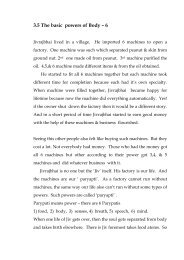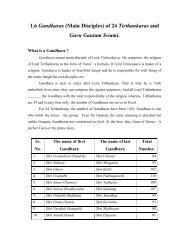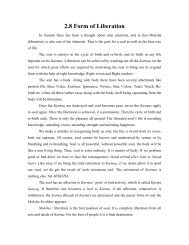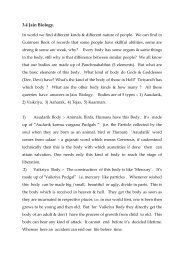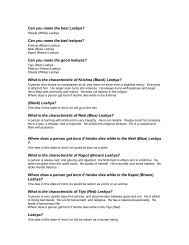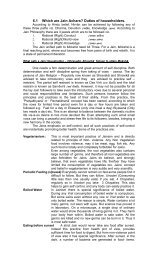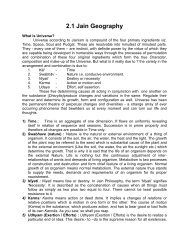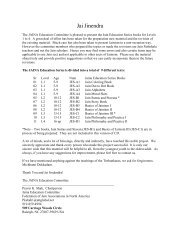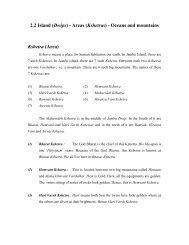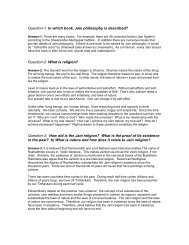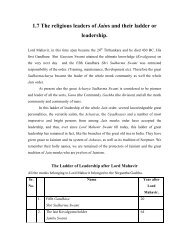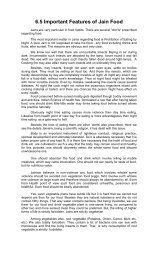Paryushan Parva - Jainism, Jain Religion - colleges
Paryushan Parva - Jainism, Jain Religion - colleges
Paryushan Parva - Jainism, Jain Religion - colleges
Create successful ePaper yourself
Turn your PDF publications into a flip-book with our unique Google optimized e-Paper software.
Pratikraman in English with Meaning<br />
Going Back to the Path of Purification<br />
2. Aimuttä Muni<br />
Aimuttä was the prince of Polaspur’s king. Once this seven year old child was playing with a few<br />
friends in the streets. It was a very hot day. At this time child Aimuttä saw Gautamswami, who<br />
was bare-footed and bald, and was making rounds for Gochari (food). Aimuttä ran to him and<br />
asked him why he was wandering. On hearing the answer Aimuttä took Gautamswami to his<br />
house.<br />
His mother was pleased with his devotion and welcomed Gautamswami by the greeting,<br />
“Mathen Vandämi” (I solemnly bow with my head down). Aimutta’s mother introduced<br />
Gautamswami as a learned Ganadhar of Lord Mahavir. Aimuttä responded that they were so<br />
lucky to give him Gochari and proceeded to listen to Gautamswami’s discourse.<br />
When it was time for Gautamswami to leave, Aimuttä asked Gautamswami if he could carry<br />
the bag (containing food utensils) that Gautamswami was holding so diligently. Gautamswami<br />
told him that the bag could only be carried by one who has accepted monkshood.<br />
The boy desired this monkshood, but he was told that he needed his parents’ permission. The<br />
mother, upon hearing the request, told him he was only a child and not familiar with the rigorous<br />
code of conduct that a Muni has to live by. Aimuttä insisted on Dikshä (monkshood), saying that<br />
the code cannot be known beforehand, and that he was willing to suffer all the hardships that may<br />
follow.<br />
He told his mother that he knew two things: (1) One who is born, is sure to die; and (2) One does<br />
not know when he will die. Although still a child, Aimuttä explained the transitory nature of life<br />
to his mother, who remained silent.<br />
After making Aimuttä the king for one day, he was permitted to take the initiation before Lord<br />
Mahavir. Then he was entrusted to an elderly Muni for training. He then began to learn.<br />
One day, young Aimuttä Muni went with the elderly Muni to the lake. While the elderly Muni was<br />
resting, Aimuttä Muni saw children playing with paper sailboats in the water, and he also put his<br />
small pot in the lake and told the other boys how nicely his boat was floating.<br />
On seeing this the old Muni told Aimuttä Muni that he had become a Muni and thus had taken<br />
vows not to harm the all kinds of living organisms and here, Aimuttä Muni was breaking his vow.<br />
Feeling deeply ashamed of himself, Aimuttä Muni went to Lord Mahavir with great repentance and<br />
while reciting “Iriävahiä Sutra,” he began crying. He uttered the words, “Pankkamane<br />
Biyakamane” and began to apologize to all living beings. While doing so, he attained Kevalgnän<br />
(perfect knowledge) and ultimately got liberation.<br />
MORAL LESSON: We often say this Iriävahiä Sutra ourselves, but only as a recital of words is<br />
“Dravya Kriyä” (mechanically). However, if recited with true and sincere repentance, it can<br />
become a “Bhäv Kriyä” (have complete internal involvement).<br />
46




